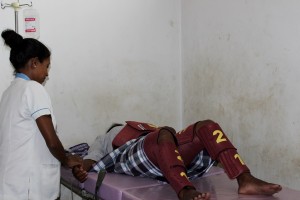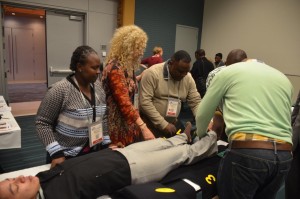Dear Friends and Supporters of Safe Motherhood, Bixby Center, UCSF:
Year-end greetings to all of you, the fabulous individuals who support the UCSF Safe Motherhood Program. As every year, we wish to thank you for your generosity and to let you know some of the activities you supported this year.
Our Lifewrap/NASG activities continue unabated. Lifewraps are now being used in over 30 countries globally, with Ethiopia, Nigeria, Tanzania, Timor Leste, and the Southern Indian State, Tamil Nadu having widely scaled up. Our colleagues in Central and South America have been very busy, with new Lifewrap programs in Bolivia, Colombia, Peru, Haiti, Dominican Republic, among others. The new president-elect of the International Federation of Gynecologists and Obstetricians (FIGO), Dr. Carlos Fruthner of Bolivia and Dra. Maria Fernanda Escobar of Columbia have trained thousands of midwives and obstetricians throughout Latin America. Dra Escobar manages a 60-bed teaching maternity hospital for high risk women, she told me excitedly: We teach all the residents, interns, and student midwives, at the first sign of hemorrhage apply the “TAN” (traje anti-chocque no neumatico).
UNITED NATIONS COMMISSION on LIFESAVING COMMODITIES (UNCoLSC):
A huge effort effected in 2015 was the addition of the LifeWrap/NASG to the United Nations’ Life Saving Commodities for Women and Children. In association with UCSF, Clinton Health Access Initiative (CHAI), PATH, and BlueFuzion, UNCoLSC announced a new partnership to add the LifeWrap to their list of essential life saving commodities for a special reduced price to Low Income Countries. At $42.00 per LifeWrap, this represents a significant decrease in price, and, with our new cleaning protocol, results in a cost per use of approx. $0.30.
SYRIA: After our last year efforts with the International Red Cross we are now holding training sessions via Skype with the brave humanitarian Red Cross workers in Syria. Their needs are so great, and the LifeWrap is a small contribution to keeping mothers safer during childbirth in these uncertain conditions. The refugee situation will only increase during these winter months and we will try to keep you abreast of the situation and the role you can play in getting LifeWraps to Syria.
TANZANIA: The project with Ifakara Health Institute continues and the IHI staff are working tirelessly to bring Lifewrap to 324 remote rural clinics in Tanzania. Michelle Skaer, our training expert, traveled with Ifakara staff by vehicle up to 14 hours/day to reach those places most distant from regular access to district hospitals. They trained 900 health care workers and cleaners. My colleague in Tanzania, Dr. Robert Tillya wrote to me: “A woman delivered at home and bled for about four hours, then was brought to the dispensary while unconscious. She regained consciousness a few minutes after a LifeWrap was applied. The Nurse was alone at the dispensary and the ambulance didn’t arrive until 20 hrs after the phone call. The nurse had to walk almost a kilometer searching for network to make the emergency call.” You can see and hear the woman talking about her rescue in this video.
 Our work in TIMOR LESTE with JSI continues and their reports of success with LifeWraps are encouraging. In their annual report to USAID, Dr. Reg Gipson writes:
Our work in TIMOR LESTE with JSI continues and their reports of success with LifeWraps are encouraging. In their annual report to USAID, Dr. Reg Gipson writes:
A 22 year old woman with 3 previous pregnancies and births delivered a baby at home with the assistance of a relative/family member. Shortly after delivery she began to hemorrhage Her husband called the midwife and asked them to send the ambulance so they could bring her to the closest health facility. After she arrived the midwife estimated the mother had lost 1000 mL of blood, so she rapidly applied the LifeWrap and arranged for transport. Later the mother told the health care workers: “I started to lose consciousness when the ambulance took me from my home to the facility But after they put LifeWrap on and transferred me I felt more comfortable and started to feel better…

If it hadn’t been for the LifeWrap I would not be here to talk to you.”
After the experience, the midwife said: “I feel more confident managing obstetric hemorrhage cases now that we have LifeWrap. Before, we would just transfer a patient with PPH but we didn’t know if she would survive. But now that we have LifeWrap, we feel confident that she will arrive safely. I wish we had LifeWrap to use before.”
International Federation of Obstetricians/Gynecologists (FIGO) Conference: Oct 1-9, Vancouver
 Training Workshops: During the conference we held 5 days of hands-on PPH skills training workshops with over 500 providers from all countries attending the conference. We give our greatest appreciation for the support and participation of 8 experienced trainers from Africa and Asia.
Training Workshops: During the conference we held 5 days of hands-on PPH skills training workshops with over 500 providers from all countries attending the conference. We give our greatest appreciation for the support and participation of 8 experienced trainers from Africa and Asia.
Donated LifeWraps: Thanks to BlueFuzion, we donated the LifeWraps we used for the workshops to representatives from low income countries. LifeWraps were donated to trainees from India, Bolivia, Colombia, Sudan, Ethiopia, and Nigeria.
Presentations: Besides the 5 days of training courses at FIGO we, along with international colleagues, gave 5 other panel presentations on LifeWrap, Fistula, Shock Index, and use of uterotonics at the community level. We also gave presentations at American Public Health Association, Chicago; BIRTH conference, Fortaleza Brazil; and for the International Federations of Red Cross, Geneva.
Fistula Project Uganda: In addition to our work on maternal hemorrhage, we are also conducting new work on women’s reintegration in their communities post fistula repair, and a qualitative study of the burdens and rewards of families and communities who care for women with fistula. This project is led by Dr. Alison El Ayadi.
All in all it’s been a rewarding year for the Safe Motherhood Program in our work to reduce maternal mortality and morbidity globally.
A recent news article on “TAKE PART WORLD” tells the story of the LifeWrap.
Thank you and I hope you and yours have the happiest of holidays and a fantastic 2016.
Suellen
Suellen Miller, Professor, CNM, PhD
Safe Motherhood Program
UCSF
Department of Ob/Gyn and Reproductive Sciences
